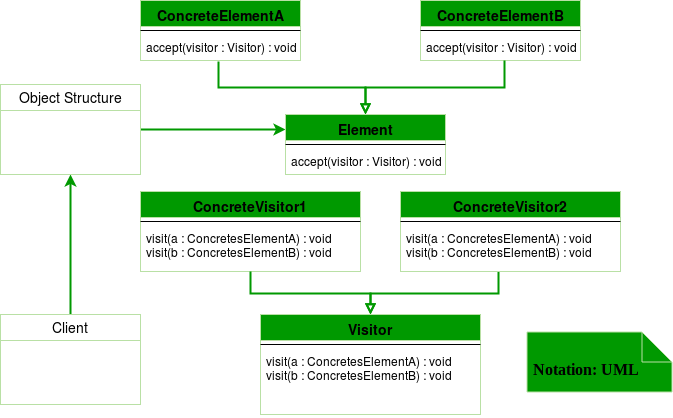访问者设计模式是行为设计模式中的一种。当我们必须对一组相似类型的对象执行操作时使用它。在访问者模式的帮助下,我们可以将操作逻辑从对象移动到另一个类。
访问者模式由两部分组成:
- 一个名为Visit()的方法,由访问者实现,并为数据结构中的每个元素调用
- 提供接受访问者的Accept()方法的可访问类
UML 图访问者设计模式

设计组件
- Client : Client 类是访问者设计模式类的使用者。它可以访问数据结构对象并可以指示它们接受访问者以执行适当的处理。
- Visitor :这是一个接口或抽象类,用于声明所有类型的可访问类的访问操作。
- ConcreteVisitor :对于每种类型的访问者,必须实现在抽象访问者中声明的所有访问方法。每个访客将负责不同的操作。
- Visitable :这是一个声明接受操作的接口。这是使访问者对象能够“访问”对象的入口点。
- ConcreteVisitable :这些类实现了 Visitable 接口或类并定义了接受操作。使用 accept 操作将访问者对象传递给此对象。
让我们看一个Java中访问者设计模式的例子。
interface ItemElement
{
public int accept(ShoppingCartVisitor visitor);
}
class Book implements ItemElement
{
private int price;
private String isbnNumber;
public Book(int cost, String isbn)
{
this.price=cost;
this.isbnNumber=isbn;
}
public int getPrice()
{
return price;
}
public String getIsbnNumber()
{
return isbnNumber;
}
@Override
public int accept(ShoppingCartVisitor visitor)
{
return visitor.visit(this);
}
}
class Fruit implements ItemElement
{
private int pricePerKg;
private int weight;
private String name;
public Fruit(int priceKg, int wt, String nm)
{
this.pricePerKg=priceKg;
this.weight=wt;
this.name = nm;
}
public int getPricePerKg()
{
return pricePerKg;
}
public int getWeight()
{
return weight;
}
public String getName()
{
return this.name;
}
@Override
public int accept(ShoppingCartVisitor visitor)
{
return visitor.visit(this);
}
}
interface ShoppingCartVisitor
{
int visit(Book book);
int visit(Fruit fruit);
}
class ShoppingCartVisitorImpl implements ShoppingCartVisitor
{
@Override
public int visit(Book book)
{
int cost=0;
//apply 5$ discount if book price is greater than 50
if(book.getPrice() > 50)
{
cost = book.getPrice()-5;
}
else
cost = book.getPrice();
System.out.println("Book ISBN::"+book.getIsbnNumber() + " cost ="+cost);
return cost;
}
@Override
public int visit(Fruit fruit)
{
int cost = fruit.getPricePerKg()*fruit.getWeight();
System.out.println(fruit.getName() + " cost = "+cost);
return cost;
}
}
class ShoppingCartClient
{
public static void main(String[] args)
{
ItemElement[] items = new ItemElement[]{new Book(20, "1234"),
new Book(100, "5678"), new Fruit(10, 2, "Banana"),
new Fruit(5, 5, "Apple")};
int total = calculatePrice(items);
System.out.println("Total Cost = "+total);
}
private static int calculatePrice(ItemElement[] items)
{
ShoppingCartVisitor visitor = new ShoppingCartVisitorImpl();
int sum=0;
for(ItemElement item : items)
{
sum = sum + item.accept(visitor);
}
return sum;
}
}
输出:
Book ISBN::1234 cost =20
Book ISBN::5678 cost =95
Banana cost = 20
Apple cost = 25
Total Cost = 160
在这里,在实现 if accept() 方法中的所有项都相同但可以不同。例如,可以有逻辑来检查项目是否空闲,然后根本不调用visit() 方法。
好处 :
- 如果操作的逻辑发生变化,那么我们只需要在访问者实现中进行更改,而不是在所有项目类中进行更改。
- 向系统添加新项目很容易,只需更改访问者界面和实现,现有项目类不会受到影响。
缺点:
- 在设计时我们应该知道visit()方法的返回类型,否则我们将不得不更改接口及其所有实现。
- 如果访问者接口的实现太多,就很难扩展。
C++中访问者模式的另一个例子
//Write CPP code here
#include
using namespace std;
class Stock
{
public:
virtual void accept(class Visitor *) = 0;
};
class Apple : public Stock
{
public:
/*virtual*/ void accept(Visitor *);
void buy()
{
cout << "Apple::buy\n";
}
void sell()
{
cout << "Apple::sell\n";
}
};
class Google : public Stock
{
public:
/*virtual*/ void accept(Visitor *);
void buy()
{
cout << "Google::buy\n";
}
void sell()
{
cout << "Google::sell\n";
}
};
class Visitor
{
public:
virtual void visit(Apple *) = 0;
virtual void visit(Google *) = 0;
//private:
static int m_num_apple, m_num_google;
void total_stocks()
{
cout << "m_num_apple " << m_num_apple
<< ", m_num_google " << m_num_google << '\n';
}
};
int Visitor::m_num_apple = 0;
int Visitor::m_num_google = 0;
class BuyVisitor : public Visitor
{
public:
BuyVisitor()
{
m_num_apple = m_num_google = 0;
}
/*virtual*/ void visit(Apple *r)
{
++m_num_apple;
r->buy();
cout << "m_num_apple " << m_num_apple << endl;
}
/*virtual*/ void visit(Google *b)
{
++m_num_google;
b->buy();
cout << " m_num_google " << m_num_google << '\n';
}
};
class SellVisitor : public Visitor
{
public:
/*virtual*/ void visit(Apple *a)
{
--m_num_apple;
a->sell();
cout << "m_num_apple " << m_num_apple << endl;
}
/*virtual*/ void visit(Google *g)
{
--m_num_google;
g->sell();
cout << "m_num_google " << m_num_google << endl;
}
};
void Apple::accept(Visitor *v)
{
v->visit(this);
}
void Google::accept(Visitor *v)
{
v->visit(this);
}
int main()
{
Stock *set[] = { new Apple, new Google, new Google,
new Apple, new Apple, 0 };
BuyVisitor buy_operation;
SellVisitor sell_operation;
for (int i = 0; set[i]; i++)
{
set[i]->accept(&buy_operation);
}
buy_operation.total_stocks();
for (int i = 0; set[i]; i++)
{
set[i]->accept(&sell_operation);
}
sell_operation.total_stocks();
}
输出:
Apple::buy
m_num_apple 1
Google::buy
m_num_google 1
Google::buy
m_num_google 2
Apple::buy
m_num_apple 2
Apple::buy
m_num_apple 3
m_num_apple 3, m_num_google 2
Apple::sell
m_num_apple 2
Google::sell
m_num_google 1
Google::sell
m_num_google 0
Apple::sell
m_num_apple 1
Apple::sell
m_num_apple 0
m_num_apple 0, m_num_google 0